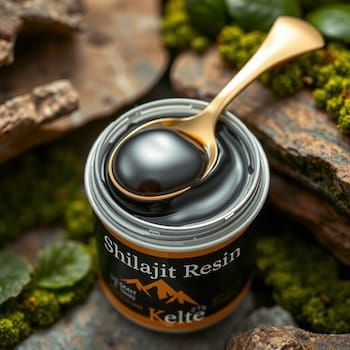The supplement industry is buzzing with claims about shilajit, a dark, sticky substance that oozes from mountain rocks. But does this ancient Ayurvedic remedy live up to the hype? Let’s dive into the science behind shilajit and separate fact from fiction.

Shilajit is a black, tar-like substance that forms over centuries through the decomposition of plant matter in mountain rock crevices. This natural phytocomplex is primarily found in the Himalayas, though it’s also discovered in Russia, Tibet, Afghanistan, and Chile. Think of it as nature’s slow-cooking process – centuries of compression and bacterial breakdown create this unique mineral-rich compound.
The substance contains 60-80% humic substances, with fulvic acid being the star player. It’s like a molecular cocktail that includes amino acids, fatty acids, and various minerals. The composition varies significantly based on location, which is why different batches can have vastly different effects.
Here’s where things get interesting. Research suggests that fulvic acid, shilajit’s main component, can block tau self-aggregation – a key process in Alzheimer’s disease development. In laboratory studies, shilajit showed promise in breaking down amyloid plaques and supporting brain cell function.
A 2023 study found that shilajit from northern Chile may help slow Alzheimer’s progression by:
The catch? Most studies are conducted in test tubes, not human brains. We’re still waiting for large-scale clinical trials to confirm these effects in real people.
Small studies suggest shilajit might boost testosterone levels and improve sperm count. But here’s the reality check – these studies are over a decade old and involve tiny sample sizes. The evidence is preliminary at best.
Shilajit’s antioxidant reputation comes from its fulvic acid content. However, there’s a paradox here. While fulvic acid can protect cells from oxidative stress, it can also increase oxidative stress in high doses. It’s like having a double-edged sword – potentially helpful or harmful depending on the amount.
Some research indicates shilajit might enhance collagen production, reduce fatigue, and improve muscle strength. But again, we’re looking at small studies with methodological issues. The evidence isn’t strong enough to crown shilajit as a performance enhancer.
Here’s where things get concerning. Raw shilajit often contains:
A 2025 study found that some shilajit supplements contained higher levels of toxic metals than raw varieties. This is particularly troubling since the FDA doesn’t regulate supplements.
| Common Side Effects | Serious Concerns |
|---|---|
| Sore throat | Hormonal imbalances |
| Headaches | Pseudohyperaldosteronism |
| Dizziness | Blood sugar interactions |
| Gastrointestinal issues | Allergic reactions |
The truth is nuanced. While shilajit shows promise in laboratory studies, the evidence for real-world benefits is thin. As Cleveland Clinic experts note, “There are only a few studies that assess shilajit’s impact on different medical conditions. And almost all of those studies are small and have methodologic problems.”
Most shilajit research suffers from:
The supplement industry loves to cherry-pick positive findings while ignoring the limitations. Don’t fall for the hype.
Leading researchers emphasize that shilajit needs more rigorous investigation before we can make definitive claims about its effectiveness. The current evidence simply isn’t strong enough to support most marketing claims.
If you’re considering shilajit, here’s what you need to know:
If you decide to try shilajit, choose products that are:
Before reaching for exotic supplements, focus on proven health strategies:
Don’t expect miraculous results. Shilajit isn’t a magic bullet for aging, energy, or cognitive function. Any benefits are likely to be modest and may not apply to everyone.
More research is needed to understand:
Until we have better evidence, approach shilajit with healthy skepticism.
Does shilajit work? The honest answer is: we don’t know for certain. While laboratory studies show promise, particularly for cognitive health, the evidence for real-world benefits remains weak. The supplement industry’s claims often exceed what the science supports.
If you’re curious about shilajit, consult with a healthcare provider first. They can help you weigh the potential benefits against the risks and determine if it’s appropriate for your situation. Remember, there’s no substitute for a healthy lifestyle and proper medical care.
The supplement world is full of promises, but not all of them deliver. Stay informed, stay skeptical, and prioritize proven approaches to health and wellness.
If you’re looking to purchase Honest Shilajit by 5 Elementum, your local health food stores or supplement shops might have the product in stock. Check with nearby retailers such as Whole Foods, Sprouts Farmers Market, and other specialty stores that focus on natural and organic products.
If you prefer to shop online for convenience, 5 Elementum offers their Himalayan Organic Shilajit Resin directly through their official website. The product is available in two sizes: 15g and 30g.
Absolutely amazed by the results. I’ve noticed an increase in my energy levels and stamina.
Great product! It has helped me with my daily routine and overall health.
Really impressed with the quality and results of this shilajit resin.
I have been using this for a while now and I feel more energized every day.
Excellent product! It’s truly helped me with my daily tasks and overall stamina.